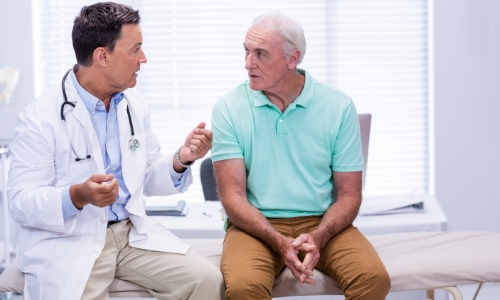800 800 001
Cancer - Identification, Causes, Risk Factors, and Treatment
Cancer is a term that encompasses a wide range of diseases marked by the abnormal growth of cells in the body. These cells divide in an uncontrollable manner and may attack and impair normal body tissues. One of the defining features of cancer is its ability to spread throughout the body, making it ...read more
The Global Impact of Cancer
Cancer is a significant global health concern and ranks as the second-leading cause of death worldwide.
With that said, there is a silver lining – survival rates have been on the rise for many types of cancer. This positive trend can be attributed to advancements in various aspects of cancer management, including early detection, treatment, and preventive strategies.
Disclaimer: The information presented in this article is for reference purposes only. It is not meant to substitute professional medical advice. For further queries or concerns, consult your doctor or a qualified healthcare professional.
Identifying the Symptoms of Cancer
The symptoms of cancer vary as per the specific part of the body affected by the disease. Some general signs and symptoms that might be indicative of cancer include:
- Fatigue - Feeling unusually tired or lacking energy.
- Hoarseness - Changes in one’s voice, leading to hoarseness
- Skin Changes - Alterations in skin colour such as yellowing, reddening, or darkening. This may also include sores that don’t heal or changes to existing moles.
- Changes in Bowel or Bladder Habits - Any noticeable shifts in your regular bowel or bladder patterns
- Respiratory Issues - Persistent cough or difficulty breathing
- Lumps or Thickened Areas - The presence of lumps or thickened areas under the skin
- Difficulty in swallowing
- Persistent indigestion or discomfort after eating
- Unexplained and persistent muscle and/or joint pain
- Weight changes in the form of unintentional weight loss or gain
- Persistent and unexplained fevers or night sweats
- Unexplained bleeding or bruising
When to Seek Medical Advice?
If you experience any of these persistent signs or symptoms, it is crucial to make an appointment with your healthcare provider promptly.
Additionally, if you are concerned about your risk of cancer, even without specific symptoms, discussing your concerns with your doctor is advisable. Your healthcare provider can recommend appropriate cancer screening tests and procedures tailored to your individual risk factors.
Understanding the Causes of Cancer
Cancer's development is primarily driven by changes or mutations in the DNA within cells. Inside each cell, DNA is organised into genes, each containing instructions governing cell functions, growth, and division.
Errors in these instructions can disrupt normal cell processes and potentially lead to cancerous cell growth.
Gene Mutations and Their Impact
Gene mutations can trigger various responses in healthy cells, including:
- Rapid Growth: Some mutations instruct cells to grow and divide more quickly, which can lead to the creation of numerous mutated cells.
- Loss of Growth Control: Normal cells possess controls (tumour suppressor genes) that manage their growth. Mutations in these genes can cause cells to lose this control, resulting in unchecked growth and accumulation.
- DNA Repair Errors: DNA repair genes in cells are responsible for identifying and fixing DNA errors. Mutations in these genes may lead to uncorrected errors, potentially leading to cancer.
While these are the most common mutations associated with cancer, numerous other gene mutations can contribute to its development.
Factors Behind Gene Mutations
Gene mutations can occur for various reasons, including:
- Inherited Mutations: Some individuals are born with genetic mutations inherited from their parents. However, this accounts for only a small percentage of cancer cases.
- Acquired Mutations: The majority of gene mutations happen after birth and are not inherited. Factors such as smoking, viruses, hormones, exposure to radiation, carcinogenic chemicals, obesity, chronic inflammation, and a lack of exercise can contribute to these acquired mutations. While cells have mechanisms to recognise and repair mistakes in DNA during normal growth, errors may occasionally go uncorrected, which can potentially lead to cancer.
The Interplay of Gene Mutations
Gene mutations inherited and acquired throughout one's life can interact in complex ways to contribute to cancer development. For instance, an inherited genetic mutation may increase susceptibility to cancer when exposed to specific cancer-causing factors.
The exact number of mutations required for cancer to form varies among different types of cancer, and this aspect remains a topic of ongoing research.
Risk Factors for Cancer
Although doctors have identified various factors that can increase an individual's risk of cancer, it's essential to note that several cancer cases have been observed in people without any known risk factors.
Here is a list of the common risk factors -
- Age: Cancer often takes years to develop and is more prevalent in older adults. However, it’s worth remembering that cancer can affect individuals of all ages.
- Environmental Factors: Harmful chemicals in the environment, such as asbestos and benzene, may raise cancer risk even in non-smokers.
- Family History: While only a small portion of cancers are due to inherited conditions, a family history of cancer may indicate the presence of inherited mutations. Note that genetic testing can help assess the risk in such cases.
- Health Conditions: Some chronic health conditions like ulcerative colitis can significantly increase the likelihood of certain cancers.
- Lifestyle Choices: Certain habits, such as smoking, excessive alcohol consumption, obesity, prolonged sun exposure, and unsafe sexual practices, are associated with an increased risk of cancer.
Complications Associated with Cancer
Cancer and its treatment can lead to several complications -
- Pain: A few types of cancer and their related treatments can cause pain. However, various medications and approaches are available now to manage cancer-related pain.
- Weight Loss: Cancer can lead to weight loss, which is often challenging to address since it may not respond to typical dietary adjustments.
- Breathing Difficulties: Cancer or its treatment can lead to a sensation of breathlessness, which may be alleviated with appropriate treatments.
- Nausea: While certain types of cancer and treatments can induce nausea, medications and other therapies can be used to reduce or even prevent it.
- Fatigue: Fatigue is common in people with cancer and may be associated with treatments like radiation therapy or chemotherapy.
- Digestive Issues: Bowel changes like diarrhoea or constipation can occur due to cancer or its treatment.
- Chemical Imbalances: Cancer can disrupt the body's chemical balance, which can lead to symptoms such as excessive thirst, constipation, frequent urination, and confusion.
- Neurological Complications: Cancer can have a considerable impact on nerves, which can cause pain and loss of function. In the case of cancer related to the brain, headaches and other neurological symptoms may be observed.
- Immune Reactions: In some cases, the immune system may react to cancer by attacking healthy cells, resulting in rare conditions known as paraneoplastic syndromes.
Cancer Progression and Recurrence
As cancer advances, it may spread to other parts of the body — this process is known as metastasis. The specific locations to which cancer spreads depend on the type of cancer.
Additionally, some individuals who have undergone cancer treatment may face the risk of cancer recurrence. Certain cancers are more prone to recurrence than others. For this reason, doctors often devise follow-up care plans for cancer survivors, including periodic scans and exams to monitor for any signs of cancer recurrence.
Preventing Cancer
Here are some common strategies cited by doctors to reduce the risk of cancer -
- Stop Smoking: Smoking is linked to various types of cancer, so quitting or avoiding smoking is a critical step in reducing your future cancer risk.
- Healthy Diet: It is advisable to opt for a diet rich in fruits and vegetables, whole grains, and lean proteins while limiting processed meats.
- Regular Exercise: Engage in regular physical activity, aiming for at least 30 minutes for most days of the week.
- Keep a Healthy Weight: One should aim to achieve and maintain a healthy weight through a balanced diet and regular exercise.
- Immunisations: Enquire about vaccinations against certain viruses that increase cancer risks such as hepatitis B and HPV.
- Moderate Alcohol Consumption: If you choose to drink alcohol, do so in moderation, following recommended guidelines.
- Sun Protection: Protect your skin from harmful ultraviolet (UV) rays by wearing protective clothing, remaining in the shade, and applying sunscreen.
- Cancer Screening: Discuss with your doctor the most appropriate cancer screening exams based on your individual risk factors.
By adopting these preventive measures and being vigilant about your health, you can take proactive steps to reduce your risk of cancer and promote overall well-being. Regular communication with your healthcare provider is essential in addressing any concerns and developing a personalised plan for cancer prevention and early detection.
Cancer Diagnosis: Early Detection Matters
Detecting cancer in its earliest stages offers the best chances for successful treatment.
If you suspect or are concerned about cancer, discussing potential cancer screenings with your doctor is crucial. Different types of cancer screening tests are available, and their recommendations may vary based on individual risk factors.
Screening for Specific Cancers
Research shows that for certain cancers, screening tests can be life-saving as they can assist in identifying the disease in its early stages. However, not all cancers benefit from routine screening, and these tests are typically recommended for individuals at an increased risk.
Methods for Cancer Diagnosis
Doctors employ several methods and technologies to diagnose cancer -
- Physical Examination: During a physical exam, a doctor may palpate the body for unusual lumps or abnormalities that could indicate cancer. They may also look for organ enlargement and changes in skin colour as potential signs.
- Laboratory Tests: Blood and urine tests can detect abnormalities that might be related to cancer. For example, a whole blood count (CBC) can reveal irregular white blood cell counts in individuals with leukaemia.
- Imaging Tests: Noninvasive imaging tests like CT scans, PET scans, MRIs, ultrasounds, bone scans, and X-rays allow doctors to examine internal organs and bones for potential cancerous growth.
- Biopsy: To confirm cancer, a biopsy is often necessary and the most definitive way to diagnose cancer. During a biopsy, a sample of tissue or cells is collected and examined in a laboratory. The specific biopsy method that will be used depends on the type and location of the suspected cancer.
Understanding the Stages of Cancer
On the diagnosis of cancer, doctors determine the stage of cancer. This helps your doctor with respect to the assessment of the extent of the cancer's spread and making decisions regarding the treatment. Staging might involve additional imaging tests like X-rays or bone scans to check for metastasis (spread to other body parts).
Cancer stages are usually classified using Roman numerals from 0 to IV, with higher numbers indicating that the cancer has advanced. Some cancers employ letters or words for staging.
Exploring Treatment Options
Options for cancer treatment depend on several factors including the cancer stage and type, your overall health, and personal preferences. It’s necessary to collaborate with your doctor to weigh the benefits and risks of each treatment method.
Goals of Cancer Treatment
Listed below are the general objectives of cancer treatment -
- Cure: The primary goal of treatment is to cure cancer and provide a chance for a normal lifespan depending on the situation.
- Primary Treatment: The main objective is to entirely remove the cancer from the body or eliminate cancer cells. Surgery is often the primary treatment for many common cancers. However, radiation therapy or chemotherapy might also serve as primary treatments, especially if the cancer responds well to these methods.
- Adjuvant Treatment: Adjuvant therapy aims to eradicate any remaining cancer cells after primary treatment to reduce the risk of recurrence. Adjuvant therapies may include radiation therapy, chemotherapy, and hormone therapy.
- Palliative Treatment: This approach alleviates treatment side effects and cancer-related symptoms. Surgery, chemotherapy, radiation, and medications can provide relief, even when a cure isn't feasible.
Treatment Opportunities
Medical professionals have various tools at their disposal to treat cancer such as -
- Surgery: Surgery is done with the primary goal of removing cancerous tissue.
- Radiation Therapy: High-energy beams like protons and X-rays can be used to target and destroy cancer cells. The beams may come from an external machine or be placed inside the body.
- Hormone Therapy: For hormone-driven cancers, this treatment blocks or removes hormones to inhibit cancer cell growth.
- Chemotherapy: As the name suggests, this method employs drugs to kill cancer cells.
- Bone Marrow Transplant: This procedure, also known as a stem cell transplant, can replace diseased bone marrow.
- Immunotherapy: It harnesses the immune system to identify and combat cancer cells.
- Targeted Drug Therapy: This method uses drugs to specifically target cancer cell abnormalities.
Depending on the cancer type and patient-specific factors, one or more of these treatments may be recommended.
Considering Alternative Medicine
While alternative medicine cannot cure cancer, it can certainly help manage side effects and improve well-being during treatment.
Techniques like acupuncture, massage, meditation, relaxation, hypnosis, and yoga may aid in symptom relief. With that said, always consult your doctor before pursuing alternative therapies as there is a chance that they might interfere with your cancer treatment.
How to Provide or Access Support?
A cancer diagnosis can be life-altering and have a significant impact in terms of your emotional and physical well-being. Finding ways to cope is crucial:
- Lean on Loved Ones: Friends and family can provide practical and emotional support.
- Educate Yourself: Learn about your cancer, treatment options, and prognosis to make informed decisions.
- Seek Professional Help: Consider counselling, support groups, or talking to a counsellor or a medical social worker.
Preparing for Medical Appointments
To make the most of your medical appointments, you should prepare yourself in advance. Here’s how you can do the same -
- Be Aware of Restrictions: Check if there are any pre-appointment restrictions such as dietary changes.
- Record Symptoms: Document all symptoms, even those seemingly unrelated to your appointment reason.
- Sharing Personal Information: Mention stressors and recent life changes if any.
- Family History: Record family members' cancer history.
- Medications List: List all medications, vitamins, and supplements
Can Health Insurance Help with Conditions like Cancer?
Cancer is covered under most critical illness health insurance covers. When an individual covered by such an insurance plan is diagnosed with cancer, their insurance company provides a one-time payment up to the specified limit. This payment can be utilised to cover the expenses associated with cancer treatment as well as other daily expenses, loss of income, and more.
You can get a critical illness cover as a standalone plan or through a comprehensive health insurance plan with this inclusion.
Policybazaar UAE – Helping you navigate the wilderness of the insurance world!
More From Health Insurance
- Recent Articles
- Popular Articles























